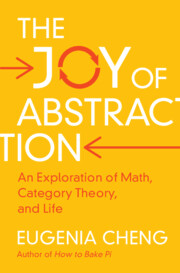Book contents
- Frontmatter
- Dedication
- Contents
- Prologue
- Part One Building up to Categories
- Interlude A Tour of Math
- Part Two Doing Category Theory
- 14 Isomorphisms
- 15 Monics and epics
- 16 Universal properties
- 17 Duality
- 18 Products and coproducts
- 19 Pullbacks and pushouts
- 20 Functors
- 21 Categories of categories
- 22 Natural transformations
- 23 Yoneda
- 24 Higher dimensions
- Epilogue Thinking categorically
- Appendices
- Glossary
- Further Reading
- Acknowledgements
- Index
14 - Isomorphisms
from Part Two - Doing Category Theory
Published online by Cambridge University Press: 13 October 2022
- Frontmatter
- Dedication
- Contents
- Prologue
- Part One Building up to Categories
- Interlude A Tour of Math
- Part Two Doing Category Theory
- 14 Isomorphisms
- 15 Monics and epics
- 16 Universal properties
- 17 Duality
- 18 Products and coproducts
- 19 Pullbacks and pushouts
- 20 Functors
- 21 Categories of categories
- 22 Natural transformations
- 23 Yoneda
- 24 Higher dimensions
- Epilogue Thinking categorically
- Appendices
- Glossary
- Further Reading
- Acknowledgements
- Index
Summary
This chapter begins Part II of the book, in which we build on the basic definition of a category and think about particular types of structure that might be of interest in any given category. This chapter is about how category theory provides a more nuanced approach to sameness, called isomorphism. We define inverses and isomorphisms. We give a sense in which a category treats isomorphic objects as the same. We then study isomorphisms of sets and show that the categorical definition corresponds to the elementary notion of bijection (where “elementary” means “defined with reference to elements”). We then look at isomorphisms of monoids, groups, and partially ordered sets, showing that these are just structure-preserving maps that also happen to be a bijection, and we discuss how these exhibit things with the same structure. We show that the situation is different for topological spaces, as not every bijective continuous map has a continuous inverse. We briefly touch on the idea of isomorphisms of categories, explaining that this is not the best level of sameness of categories. We finish by mentioning further topics: groupoids, categorical uniqueness, and categorification.
Information
- Type
- Chapter
- Information
- The Joy of AbstractionAn Exploration of Math, Category Theory, and Life, pp. 165 - 185Publisher: Cambridge University PressPrint publication year: 2022
